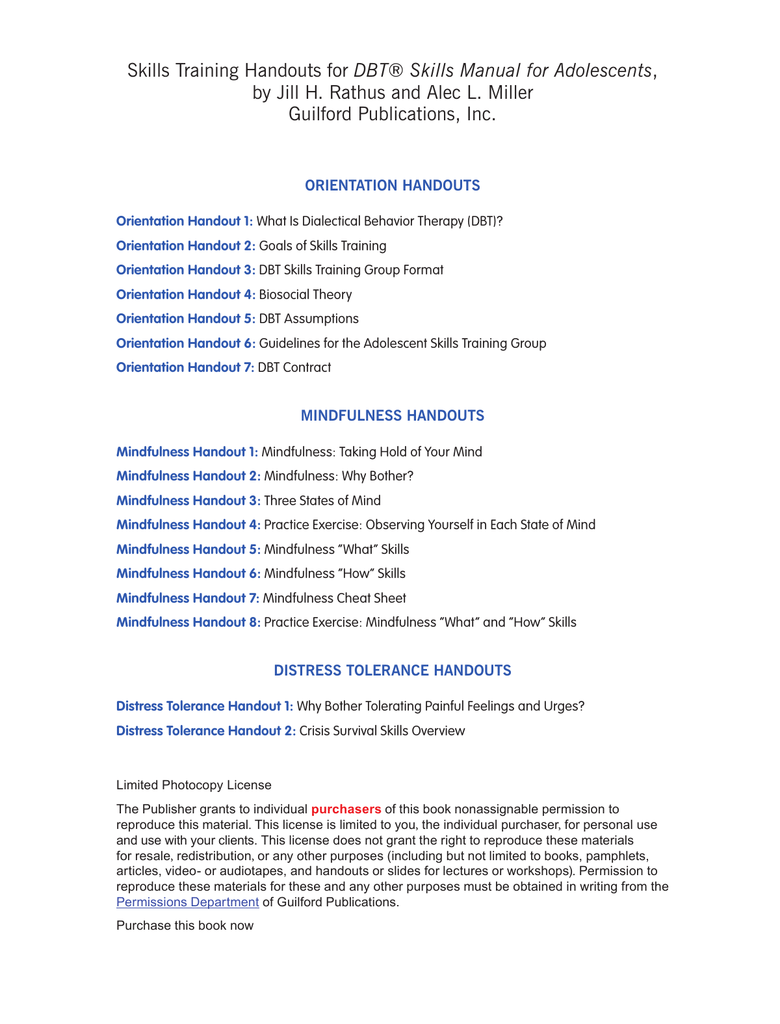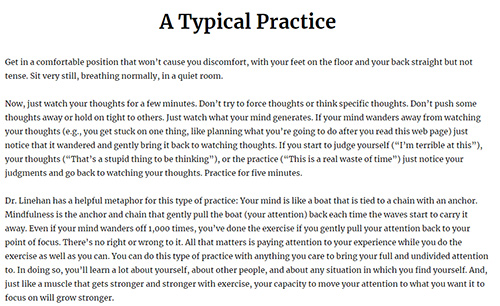Standard Workshop
This workshop is intended for therapists who are familiar with, as well as those with little or no previous exposure to DBT or cognitive behavioral therapy.
The following topics are covered:

Distress Tolerance is a module in Dialectical Behavior Therapy (DBT), and there are several skills taught as a part of this module (Linehan, 2014). These skills are often called “ crisis survival skills” because they help a person navigate a (perceived or actual) crisis (Linehan, 2014). From Linehan’s (1993b) manual, such as distress tolerance skills, as well as elements of DBT individual therapy, such as behavioral chain analyses of a recent episode of self-harm, and other. Preview of PDF on Intro to DBT Handouts, which accompany Peer Guided DBT Lessons.
2 The Dialectical Behavior Therapy Skills Workbook 1. Distress tolerance will help you cope better with painful events by building up your resiliency and giving you new ways to soften the effects of upsetting circumstances. Mindfulness will help you experience more fully the present moment while focusing.


- A dialectical biopyschosocial theory of borderline personality disorder
- Structuring treatment for multi-problem, high-suicide risk clients
- Basic strategies used in individual DBT
- Enhancing & maintaining the therapy relationship
- Dealing with unrelenting crisis, applying behaviour change principles
- Application and practise of DBT skills of Mindfulness, Distress Tolerance, Interpersonal Effectiveness, and Emotional Regulation. Group issues in DBT.
Advanced Workshop
The following topics are covered:
- How to improve outcomes in individual DBT
- Structuring the session, Targeting & Case Formulation, Behavioural chain analysis and solution analysis, Contingency Management & Stylistic Strategies
- Managing life-threatening behaviours
- Monitoring adherence and outcomes
- Common pitfalls and problems and how to overcome them
- Complex case review (clinicians will be asked to complete a case formulation prior to the workshop for discussion)
What is DBT?
Marsha Linehan and colleagues developed a systematic cognitive-behavioural treatment called Dialectical Behaviour Therapy (DBT) for working with individuals who meet criteria for borderline personality disorder. DBT is based on the assumption that individuals with Borderline Personality Disorder have problems with emotional regulation. The therapy aims to teach skills to improve emotional regulation which includes interpersonal skills, mindfulness and distress tolerance skills. Personal and environmental factors inhibit the use of behaviour skills that the individual possesses and frequently reinforce inappropriate behaviours. In individual treatment, DBT focuses on motivational issues and seeks to balance skill development with a supportive context that validates the person’s experiences.
However DBT also involves a considered focus on the therapeutic relationship and to therapy interfering behaviours. Examples of therapy interfering behaviours include the client’s poor compliance with aspects of the treatment contract, emotional withdrawal during sessions, missed appointments, and anger towards the therapist.
About the Presenters

Dr Christopher Lee was Senior Clinical Psychologist at a major teaching hospital in Perth (Sir Charles Gairdner Hospital) for 11 years where he set up the DBT treatment team for Borderline Personality Disorders. He is now programme chair in clinical psychology at Murdoch University. He has had extensive training from leading figures in DBT, and has been accredited in Schema Focused Therapy by the International Society of Schema Therapists. Chris has conducted workshops in treating personality disorders throughout Australia and overseas for the last 15 years. He is involved in research on personality disorders and posttraumatic stress disorder and will present this data at the workshop. He has published in the areas of personality assessment and the treatment of PTSD. He is a principal investigator in an international multicentre randomized control trial for borderline personality disorder.
Dr Sian Jeffery is the Coordinator of the DBT programs at Fremantle Mental Health Service (FMHS) since 2009. Dr Jeffery was involved in the establishment of both the comprehensive year long DBT program and a 20 week DBT skills group at FMHS. Dr Jeffery has completed intensive DBT training with Behavioral Tech (Marsha Linehan’s research and training organisation), as well as with the Portland DBT Institute. Dr Jeffery has a keen interest in personality disorders and was involved in the establishment of a state-wide Personality Disorders Interest Group in Western Australia and was the inaugural chair of this group. She has been an invited reviewer for journal articles in this area and has provided numerous presentations and workshops on working with borderline personality disorder and DBT around Australia. Dr Jeffery provides regular supervision in DBT and has consulted to a number of public and private services as they established their own DBT programs.
Dialectical Behavior Therapy (DBT) is one of the fastest growing approaches — because it works! It harnesses the power of CBT and mindfulness in a strategic way that gets results.
Dialectical Behavioral Therapy Pdf
And now you can learn how to share and adapt the evidence-based DBT model for children and adolescents in practical and engaging ways — tailored to their unique developmental needs.
Join DBT expert Jean Eich, Psy.D, LP, to discover how DBT can help the kids you work with manage out of control behaviors and emotional regulation deficits that can often be associated with ADHD, attachment disorder, ODD, eating disorders, anxiety, depression, substance abuse and more...
You'll get step by step instruction on how to use mindfulness strategies and techniques that will help young clients observe and identify moments of distress, master skills to manage their emotions and behaviors, and develop communication strategies to talk about how they're feeling so they can maintain healthy, positive relationships.
Dialectical Behavior Therapy Distress Tolerance Skills
This course will help make even your most challenging child and adolescent clients easier to treat by showing you step by step how you can use DBT in a fluid and flexible way specific to your clients — so you can help transform treatment outcomes and improve the health, well-being and happiness of today's youth.
